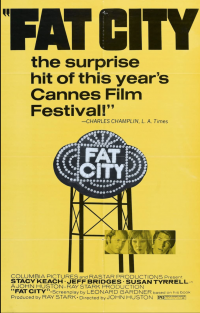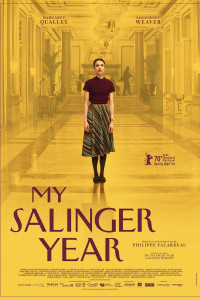






Mona Bowen on Judd Apatow's streaming The Bubble, Jeff Godsil on John Huston's forgotten gem Fat City, Matthew of KBOO's Gremlin Time on My Salinger Year, and in the book corner film historian Joseph McBride's new and unexpected volume on the JFK assassination, Political Truth: The Media and the Assassination of President Kennedy.
––––––––––––––––––––––––––––––––––––––––––––––––––––––––––––––––––––
Last week we reviewed Joseph McBride's new book on the Coen Brothers. But that's not his only recent book. Another one is Political Truth: The Media and the Assassination of President Kennedy.
You might wonder, what business does a film historian have in writing about the JFK assassination? Well, for one thing, there is a precedent. Not too long ago, Joan Mellen, who is a specialist in Japanese cinema, wrote a book about the Jim Garrison case against Clay Shaw in New Orleans in 1968, and in fact wrote from personal experience, as she was one of the volunteers.
Another factor is that Joseph McBride comes from a newspaper family. Both his parents were writers for big city dailies, and he himself wrote his first book, about baseball slang, as a teenager, eventually also contributing to the dailies. He refers to himself as a reporter as much as he does as an historian. He published a two-part investigative series in The Nation about George H. W. Bush and his links to the CIA.
His mother was also co-chair of the 1960 Kennedy for president committee in his town, and as a consequence he even met Kennedy a couple of times and took snaps of the candidate.
An earlier book, also self-published, called Into the Nightmare: My Search for the Killers of President John F. Kennedy and Officer J. D. Tippit focused on the shooting of Dallas policeman Tippit, and exhaustively looked at all extant material and witnesses in that aspect of the JFK conspiracy.
Mr. McBride brings a tenacity few other independent researchers have brought to the JFK case. For example in the earlier book he tracked down Tippet’s father, the only researcher to do so.
The current book grew out of a single chapter in the previous volume, one in which McBride treated some examples of the media's role in limiting what one could or should think about the assassination. Here, that premise is expanded to a 600 page book that tracks the dispute between mainstream media and the independent researchers usually dubbed conspiracy theorists. In fact he's borrowed a name for them, "coincidence theorists." This is because the mainstream media insists that the assassination was a burst of madness in an otherwise sane and orderly society.
Ultimately the book tracks the roots of suspicion about government and its stenographers in the press to the JFK assassination through to recent years in which a large body of Americans dub most reports in newspapers and television as "fake news."
Here is an excerpt that, among other things, shows that he is not himself with the Trumpeters.
Page 54:
“Part of the self-defeating fallout in the mainstream media's adherence to the official Warren report story is that it has deepened public distrust and contempt for the media themselves. During the mendacious Bush and Cheney and Trump regimes in the 2000s, as the gap between provable truth and government fiction became a chasm, 1984, written as a warning against totalitarianism, became a virtual guidebook for how the government can mislead and gaslight the public. That practice gave rise to President Trump’s habit of labeling any news he didn't like ‘fake news,’ a charge he made to fool his gullible followers and distract attention from his own regular tactic of putting out confusing disinformation. Trump’s use of the phrase ‘fake news’ was a classic case of projection.
“But it was often surprisingly effective and remained so after he left the White House reluctantly. Partly that is the result of the long history of how our government and media actually have provided fake news to the public, to the point at which many people have become so cynical or confused that they don't know what to believe and are willing to fall for misleading stories or disbelieve stories that are actually true. Trump, who lied more routinely than even Nixon or George W. Bush, was not so much an aberration as the inevitable consequence of the undermining of democracy."
Not only does he indict the sacred cows of the New York Times such as Harrison Salisbury and Tom Wicker, but he takes on some of the leftists who eschew conspiracy thinking, for example Richard Hofstetter and his famous the paranoid style in American politics. He attacks Hofstetter as a anti-conspiritologist, and speculates that because of his dread of being exposed in the 50s before his earlier brief alignment with the communist party. But the result has been untold damage to freethinking in the American marketplace of ideas. Thomas Frank in one of his recent books also spends several pages decrying Hofstetter for his complete misunderstanding of the populist movement and both writers note that Hofstetter use the straw man arguments and rarely cited sources or proves his points. McBride is also disappointed in Noam Chomsky, Alexander Cockburn, and I. F. Stone, all for pooh-poohing the idea of conspiracies existing. He also looks at the work of novelists such as Don DeLillo and Norman Mailer. Although he admires Don DeLillo's book Libra, the fatuous coincidences of the final assassination itself are irritating.
Being a self-published book, when does run into a few typographical irregularities, such as a whole sentence from the start of a paragraph repeated at the end, and later when he lists the nine charges against conspiracy thinking, the numbers get messed up. On the other hand, I read the New York Times every day, and every day I find typos, something unimaginable 100 years ago. And also, since this is print to order, little flaws like that when they turn up can be easily fixed for a resubmitted template, which doesn't happen with mainstream publications.But that is a small price to pay for having the book in the first place, given that as he points out, mainstream publishers simply don't go in for books that don't support the Warren Report blindly. He discusses his own career as a self published author starting on page 400, and it is a unusually attractive book among those print to order items., With a cover bearing the famous photograph on the cover of a vacation in John F Kennedy reading the New York Times. This is an important book, and it constitutes one of those little recognized but important aspects of journalism, which is press criticism.
–––––––––––––––––––––––––––––––––––––––––––––––––––––––––––––––––
- KBOO



